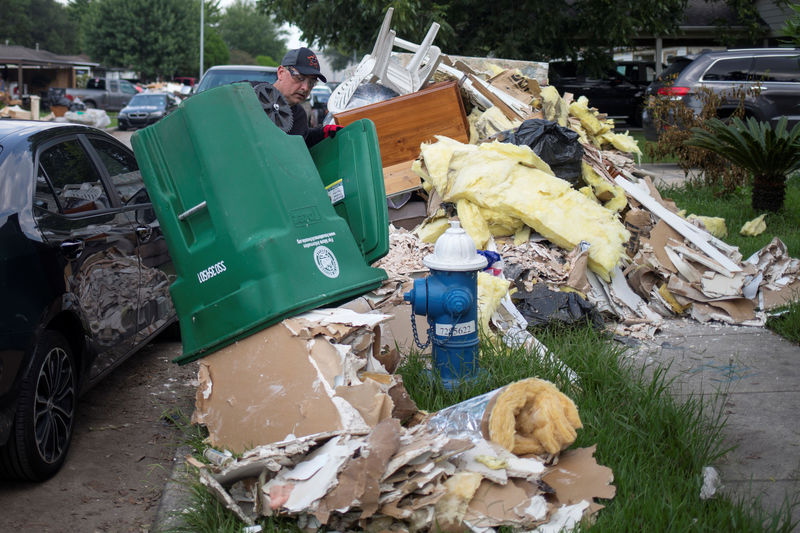By Daniel Trotta
HOUSTON (Reuters) - Texas on Monday edged toward recovery from the devastation of Hurricane Harvey as shipping channels, oil pipelines and refineries restarted some operations and authorities lifted an evacuation order for the area around a once-burning chemical plant.
Port operations across the U.S. Gulf Coast oil and gas hub were resuming, although many still had restrictions on vessel draft, according to U.S. Coast Guard updates.
U.S. gasoline prices fell in expectation that the area can get back on its feet after Harvey cut a path of destruction across more than 300 miles (480 km). The storm's record rains and flooding killed as many as 60 people, according to local officials, and displaced more than 1 million. Benchmark U.S. gasoline futures fell by more than 3 percent on Monday.
The Coast Guard allowed some barge traffic to enter Port Arthur, Texas, home of the country's largest oil refinery, and is considering allowing ships to enter on Tuesday, a spokesman said.
Flooding from Harvey caused fires at the Arkema SA chemical plant in Crosby, some 25 miles (40 km) northeast of Houston.
But on Monday, the company said the Crosby Fire Department had lifted a 1.5-mile (2.4-km) evacuation zone around the plant, allowing people to return to their homes.
The lifting of the order may help residents like Paul Mincey, a 31-year-old tugboat engineer who has been kept out of the ranch home he shares with his girlfriend, return to normal.
"It could be full of snakes for all we know. We have no idea what's in there," Mincey said from aboard a tugboat in the Houston Ship Channel, which he said was polluted by floating railroad ties, trees and trash strewn by the storm.
Like others forced from the evacuation zone, Mincey said he was eager to assess water damage and begin repairs while hoping for financial aid to deal with property damage.
(To view a graphic on Harvey's energy impact, click http://tmsnrt.rs/2xzso1S)
ANOTHER HURRICANE THREATENS
As the recovery from Harvey picked up speed, Puerto Rico Governor Ricardo Rossello declared a state of emergency and activated the National Guard in preparation Irma, a dangerous Category 4 hurricane closing in on a string of Caribbean islands.
Irma could pummel the U.S. territory on Wednesday and it also poses a threat later in the week to the Dominican Republic, Cuba and Florida, which declared a state of emergency on Monday evening.
The U.S. National Hurricane Center cautioned that it was too early to forecast the storm's exact path or what effect it might have on the U.S. mainland. But some weather models show Irma entering the Gulf of Mexico, where Harvey dealt a major blow to the most important energy hub in the United States, taking up to one-fourth of the country's oil refining capacity offline and driving up fuel prices.
Colonial Pipeline Co on Monday said it restarted one of its fuel lines shut because of Hurricane Harvey, with another line scheduled to restart on Tuesday.
Colonial is the biggest U.S. fuel system, with pipelines that connect refineries along the U.S. Gulf Coast to markets in the Northeast, transporting more than 3 million barrels a day of gasoline, diesel and jet fuel. With more pipelines coming on line, concerns about supply should ease.
Most ports in Texas were open on Monday, some with restrictions on traffic and vessel size, said Colonel Lars Zetterstrom, head of the Army Corps of Engineers' regional office in Galveston.
(To view a graphic on storms in the North Atlantic, click http://tmsnrt.rs/2gcckz5)
HOW TO PAY?
The question of how to pay for hurricane recovery was consuming Washington after Texas Governor Greg Abbott on Sunday increased his damage estimate to between $150 billion and $180 billion.
Abbott on Monday requested seven additional Texas counties be added to the Federal Disaster Declaration previously granted by the Federal Emergency Management Agency (FEMA). That would bring the total number of counties receiving assistance to 43.
Some 190,000 homes were damaged and another 13,500 destroyed, the Texas Department of Public Safety said.
At least 33,000 people sought refuge in Texas shelters overnight, with another 1,300 doing so in Louisiana, the American Red Cross said.
Republicans and Democrats returning to Washington after a month-long break will need to put differences aside in order to approve an aid package. U.S. Treasury Secretary Steven Mnuchin on Sunday challenged Congress to raise the government's debt limit in order to free up relief spending.
The U.S. House of Representatives will vote Wednesday on $7.85 billion in emergency relief funds for the FEMA and the Small Business Administration and plans another vote later this month on a separate $6.7 billion sought by President Donald Trump.
In one indication of funding needs, the Texas Department of Public Safety on Monday estimated damage to public property at $382.3 million.

(To view a graphic on Hurricane costs, click http://tmsnrt.rs/2vGkbHS)